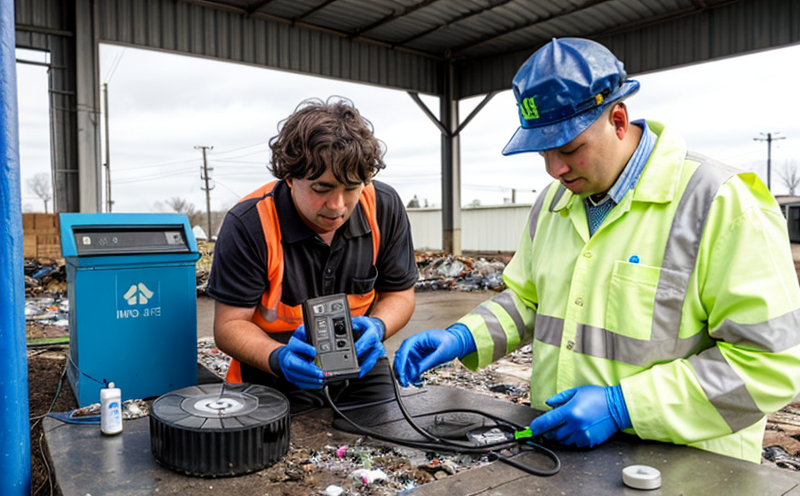ISO 14024 Ecolabel for Recycled Electronic Equipment
The ISO 14024 Ecolabel is a certification that ensures electronic products are made using recycled materials, thereby promoting sustainability and reducing environmental impact. This ecolabel applies specifically to electronic equipment where at least 65% of the product's weight comes from recycled content, as per the standards set by this international framework.
The testing process for achieving ISO 14024 compliance involves several stages that are critical in ensuring the accuracy and reliability of the results. The first step is to gather a representative sample of the electronic equipment in question. This ensures that the test results reflect the true recycled content percentage across all units manufactured.
Once samples are collected, they undergo rigorous preparation procedures which include cleaning, disassembly, and sorting. Each component must be meticulously identified for its material composition to ensure accurate assessment according to ISO 14024 guidelines. Following this stage, the materials used in these components are analyzed using advanced spectroscopy techniques such as X-Ray Fluorescence (XRF) and Inductively Coupled Plasma Mass Spectrometry (ICP-MS).
The analytical data obtained through these methods is then cross-referenced with the declared recycled content percentages provided by manufacturers. Any discrepancies between declared values versus actual measurements are thoroughly investigated until resolved satisfactorily.
Additionally, lifecycle assessment (LCA) tools like SimaPro or GaBi are employed to evaluate not only the recycled content but also other environmental impacts associated with producing these electronics. These assessments help provide a comprehensive view of how adopting recycled materials benefits both the environment and society at large.
The testing process concludes by generating detailed reports that document all steps taken during sample preparation, analysis, and evaluation. These documents serve as evidence supporting compliance claims made under ISO 14024 standards. They also highlight areas where improvements can be implemented to further enhance sustainability practices within the organization.
By adhering strictly to these stringent requirements outlined by ISO 14024, companies demonstrate their commitment towards responsible waste management and recycling initiatives. This not only enhances corporate reputation but also fosters trust among consumers who value eco-friendly products above all else.
Why It Matters
The implementation of ISO 14024 compliance in the realm of electronic waste and battery recycling is crucial for several reasons. Firstly, it helps reduce landfill volumes by promoting the reuse and reprocessing of valuable metals found within discarded devices. Secondly, it encourages innovation in designing products that are easier to disassemble and recycle post-consumption.
Moreover, obtaining this certification can significantly improve a company's image both locally and globally. Consumers increasingly favor brands committed to sustainability efforts, making eco-labeling an attractive feature for marketing campaigns aimed at environmentally conscious consumers.
From a regulatory perspective, complying with ISO 14024 ensures that businesses stay ahead of potential legislative changes related to electronic waste disposal. Many countries are introducing stricter regulations regarding the handling and recycling of hazardous materials contained in electronics. By proactively addressing these issues now, companies avoid costly penalties later down the line.
Finally, successful certification under ISO 14024 can lead to increased sales opportunities both domestically and internationally. Governments often offer incentives or favorable treatment to firms demonstrating strong environmental stewardship through certifications like this one. Internationally, it opens doors for exports into markets that prioritize green technologies over conventional manufacturing processes.
Benefits
Obtaining the ISO 14024 ecolabel brings numerous advantages to companies involved in recycling electronic equipment. One of the most significant benefits is enhanced brand reputation, as it signals to stakeholders—from investors to customers—that your organization takes environmental responsibility seriously.
Another advantage lies in reduced operational costs associated with waste management. By optimizing processes to maximize recycled material usage, businesses can minimize raw material procurement expenses while simultaneously reducing disposal fees.
The certification also facilitates compliance with stringent government regulations governing electronic waste recycling and disposal practices. Adherence to such standards prevents potential fines or legal actions that could otherwise disrupt normal operations.
Furthermore, earning the ISO 14024 ecolabel can open new markets for your products, particularly in regions where environmental sustainability is a key factor when selecting suppliers. Lastly, it provides valuable insights into product lifecycle impacts, allowing continuous improvement initiatives aimed at reducing overall ecological footprints.
Customer Impact and Satisfaction
The impact of achieving ISO 14024 ecolabel certification extends beyond just the internal operations of a company; it also has profound effects on its customers. For one, satisfied consumers are more likely to choose brands that prioritize sustainable practices over profit margins alone.
By purchasing products certified under this standard, customers contribute directly towards minimizing electronic waste and promoting responsible resource use. Such actions align with broader societal values around sustainability and environmental protection.
Moreover, satisfied stakeholders are more inclined to recommend these brands to others, thereby expanding the customer base organically without resorting to aggressive marketing tactics. This word-of-mouth endorsement not only enhances brand loyalty but also fosters long-term relationships built on mutual respect for shared values.
In addition to improved reputation and increased sales, satisfied customers appreciate knowing that their purchase decisions are contributing positively to environmental conservation efforts. This sense of fulfillment translates into higher levels of customer satisfaction overall.





